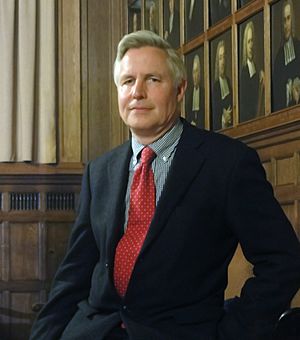Herman Philipse facts for kids
Quick facts for kids
Herman Philipse
|
|
|---|---|

At the Studium Generale of Utrecht University, 2012
|
|
| Born | 13 May 1951 |
| Nationality | Dutch |
| Alma mater | Leiden University |
| Occupation | Professor of philosophy |
| Years active | 1986–present |
| Employer | Utrecht University |
Herman Philipse (born 13 May 1951) is a professor of philosophy at Utrecht University in the Netherlands. Philosophy is a way of thinking deeply about big questions about life, knowledge, and reality.
Professor Philipse taught at Leiden University from 1986 until 2003. He earned his advanced degree, called a doctorate, in 1983.
Thinking and Writing
Herman Philipse has written many books and articles. Most of his early works were in Dutch. These include books about how we think logically and about certainty in our moral choices.
One of his well-known books is Atheist Manifesto, first published in 1995. An atheist is someone who does not believe in God.
In English, he has written many articles for philosophy journals. He also wrote a detailed book about another philosopher named Heidegger. This book is called Heidegger's Philosophy of Being: A Critical Interpretation.
Philipse often writes for Dutch newspapers, like the NRC Handelsblad. He also appears on TV shows to discuss current events. He often talks about his views on atheism. He also discusses how people from different backgrounds can live together in a country and share common values.
His Philosophical Ideas
In his work, Philipse supports an idea called naturalism. This means he believes that everything can be understood through science and nature. He thinks we don't need supernatural explanations for things. His ideas are similar to those of other thinkers like Gilbert Ryle and Peter Strawson.
Philipse has also looked closely at older philosophical ideas. For example, he has studied the ideas of Immanuel Kant and Husserl. He argues that some of their ideas about how we understand the world don't quite make sense.
He also looks at philosophies that try to explain everything using only very simple physical descriptions. These are sometimes called "scientistic" philosophies. Philipse argues that these ideas, even though they use science, can also have problems. He believes they sometimes try to simplify complex things, like our thoughts, too much.
Overall, Philipse strongly supports the values of the Age of Enlightenment. This was a time when people valued natural sciences and political liberalism. Political liberalism means supporting individual rights and freedoms.
Later Works and Research
In 2012, Philipse published an important book titled God in the Age of Science. A Critique of Religious Reason. This book explores the relationship between science and religious beliefs.
From 2014 to 2019, Professor Philipse led a research project. This project looked at how the theory of evolution might affect our ideas about right and wrong. The project was funded by the Dutch Research Council.
See also
 In Spanish: Herman Philipse para niños
In Spanish: Herman Philipse para niños
- Dirk Verhofstadt
- Etienne Vermeersch
- Floris van den Berg

